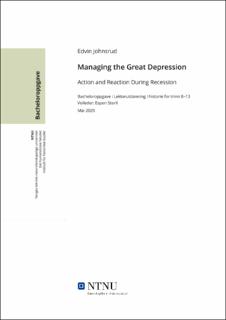| dc.contributor.advisor | Storli, Espen | |
| dc.contributor.author | Johnsrud, Edvin | |
| dc.date.accessioned | 2021-09-13T16:02:28Z | |
| dc.date.available | 2021-09-13T16:02:28Z | |
| dc.date.issued | 2020 | |
| dc.identifier | no.ntnu:inspera:57494038:22987941 | |
| dc.identifier.uri | https://hdl.handle.net/11250/2775515 | |
| dc.description.abstract | Depresjonen var en periode med store økonomiske utfordringer mellom 1929 og 1935 som rammet store deler av den vestlige verden. Starten på krisen markeres av børskrakket i 1929, ofte kalt “Black Tuesday”. Fordypningsoppgaven ser nærmere på hvordan næringslivet i Storbritannia reagerte på de nye økonomiske forholdene. Var det fellestrekk mellom ulike selskaper og industrier? Oppgaven baserer seg på to teorier presentert i ettertid. Den første handler om lederskap og lederskapsstruktur. Alfred D. Chandler hevder i sin bok Scale and Scope: The Dynamics of Industrial Capitalism at Britisk lederskapsstruktur var underutviklet i forhold til andre land som USA og Tyskland. Administrasjonen var ofte sentralisert og lite effektiv, nepotismen regjerte når nye medlemmer ble ansatt. Den andre teorien blir presentert av Thomas E. Hall og J. David Ferguson i deres bok The Great Depression : An International Disaster of Perverse Economic Policies. Boka tar for seg politiske vedtak fattet av ulike stater i løpet av depresjonen, og hevder at disse vedtakene var mye mer utslagsgivende for varigheten og alvorlighetsgraden av depresjonen enn det faktorer som ledet opp til denne perioden var. Sentrale vedtak oppgaven tar for seg er da pundet ble tatt av gullstandarden i 1931, devaluering av pundet og da tariffen for import ble endret i 1933.
Oppgavens primærkilder stammer fra to aviser, The Economist og the Financial Times. Begge avisene har publisert ulike artikler om økonomi i en årrekke, samt detaljert statistikk som oversikt over aksjepriser. I utgangspunktet er det møtereferater fra årsmøtene til de fire selskapene nevnt under som vil være i fokus, men oppgaven vil også benytte seg av andre artikler skrevet om selskapene.
Oppgaven tar for seg fire selskap; Morris Motors - en bilprodusent, Gordon Hotels - en hotellkjede, London Midland and Scottish Railway Company - et jernbaneselskap og United Glass Bottle Manufacturers - en glassflaskeprodusent. Selskapene er fra ulike sektorer i det britiske næringslivet, som vil kunne vise tiltak som ble igangsatt ikke bare i en spesifikk industri. Resultatene viser at det finnes tiltak som kun gjaldt for noen selskap, men også flere tiltak som ble iverksatt for flere av selskapene, ofte på forskjellig måte. Oppgaven konkluderer med viktigheten av politiske vedtak. Vedtak var ofte tema under årsmøtene, og det kommer ofte frem at strategien til selskapene må skreddersys til landskapet vedtakene har laget. | |
| dc.description.abstract | The Great Depression was a time period with great economic challenges between 1929 and 1935 that affected most of the western world. The beginning for the crisis is marked by the stock market crash in 1929, often referred to as “Black Tuesday”. The research paper examines how companies in Britain reacted to the new economic challenges they faced. Were there any similarities between different companies and industries? The paper is based on two theories connected to the depression. The first is all about management structure. Alfred D. Chandler claims in this book Scale and Scope: The Dynamics of Industrial Capitalism that British management structure is underdeveloped compared to companies in the US and in Germany. The administration was often centralised and lacket efficiency, and new hires to the administration were often based on nepotism. The second theory is presented by Thomas E. Hall and J. David Ferguson in their book The Great Depression : An International Disaster of Perverse Economic Policies. The book looks at important political policies implemented by different governments during the depression, and argues that these policies were more critical to the development of the depression than the economic relations leading up to the crisis. The most important policy changes that are included in the paper are the abandonment of the Gold Standard in 1931, subsequent devaluation of the pound, and when the government raised import tariffs in 1933.
The primary sources the paper is based on originates from two newspapers, The Economist and the Financial Times. Both newspapers have published different types of articles related to economics for centuries, as well as detailed statistics like prices of stocks. The paper will mainly focus on reports from the annual meetings of four different companies mentioned below, but the papers also published other articles of interest.
The paper looks at four companies; Morris Motors - a car manufacturer, Gordon Hotels - a company which owned and operated several hotels, London Midland and Scottish Railway Company - a railway company and United Glass Bottle Manufacturers - a glass bottle and tableware manufacturer. The companies are from different sectors in the British business world, which will illuminate measures taken across several industries. The results show that there are measures that only some companies applied, and some that several or all the companies applied, often in different ways. The paper also concludes on the importance of government policy. Political policy was often brought up during the meetings, and the company strategy was often tailor made to government policy. | |
| dc.language | | |
| dc.publisher | NTNU | |
| dc.title | Managing the Great Depression - Action and Reaction During Recession | |
| dc.type | Bachelor thesis | |
